If you like working with reproduction fabrics or fabrics in muted tones instead of brighter ones, like I do, your quilts will have more of an antique look. Some quilters give their finished quilts a tea (or coffee) "bath" for that vintage or older, worn look. I'm always afraid to dye the entire quilt because I don't want to ruin the contrast as ALL of the prints will become darker. That may not be quite what I want in the end.
If you're hesitant to dye your quilts to get a certain primitive look, here's what I do: Instead of dying the entire project, sometimes, before I cut fabrics for a quilt, I'll experiment with a strip or large square of a fabric I like but that may be too bright and then soak those pieces that need to be toned down in a bowl of tea. Then I'll cut what I need for a block and use pieces in my quilt so they blend in with the other prints I'm using.
Some recent blues that have been tea soaked. Original ones on top were just a teeny bit too bright. Dyed versions are on on bottom. Just a slight difference. But enough to mute the brightness. It really is a small change but it makes a difference to me.
Here's a good example. That muted, tea-dyed blue just goes so well with the other prints now. I hesitated to use it before because I thought it was too bright and would stand out too much.
(Star on top right is the one with a dyed blue center.)
I really love fabrics in shades of aqua and teal. I also love "warm" blues, with a tinge of green or gray that makes them look vintage or old. I used to be able to find these years ago. Have you noticed that good reproduction prints are getting harder and harder to find? Many of the fabrics nowadays seem to be a lot brighter as fabric companies move away from "Civil War" type prints to more modern fabrics. I find that tea dying some brighter blues will often give me the color and tone I prefer. I'm still hanging onto the style I have grown to love . . . .
I don't use a lot of bright white in my quilts. Occasionally, I'll add some lighter prints to a block or quilt to contrast with creams and tans. Think I'll dye some of that button print above or the bright white one below though.
The pinks on the left are ones I really like. Nice and slightly aged-looking prints. The ones on right are pretty too but SLIGHTLY bright for my taste.
Before - also pretty prints, just a little too bright for my taste
Here's the Recipe:
Boil water and pour into to a bowl that's large enough to soak your fabric pieces. You can also use an old pot if you don't mind if it gets stained.
Add 3-4 BLACK tea bags to the hot water. (Green tea or herbal tea will not work here but I've heard you can use these for other projects, such as cross-stitch linen.) Let the tea steep for a few minutes and then soak your fabric pieces. Depending upon what look you're after, remove the fabric after 10 minutes and see how they look. This will probably give you a faint, slightly darker look. If you want the pieces darker, soak longer or next time add more tea bags. I'm usually good with 15 minutes.
After - You can see a slight difference in the light prints after 15 minutes of soaking. I'll use that dotted one more often now. The blue didn't really change much.
I re-soaked the blue for another 1/2 hour. Still not much change but now not quite as royal blue. Clearly, lighter fabrics take the tea stain much better. Experiment with small pieces of fabric and different times until you get the look you're after. All in all, I'm happy and I'll be a little more eager to use these in my quilts now.
Of course, this is just me and I certainly don't do this all the time. I never aim for a uniform tan tone in the backgrounds of all my quilts. I do like to mix a few lighter prints here and there for contrast. But it's nice to know that if I run out of a print that happens to be the perfect color/tone for a quilt I'm making, I can make do with another one that blends in by tea dying it.

.jpeg)
.jpeg)







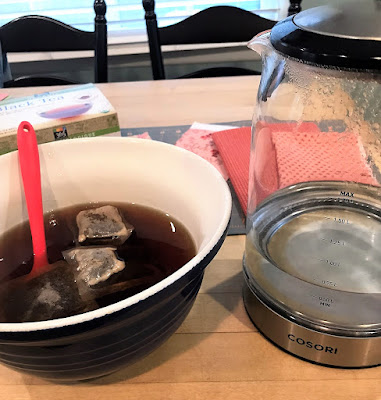
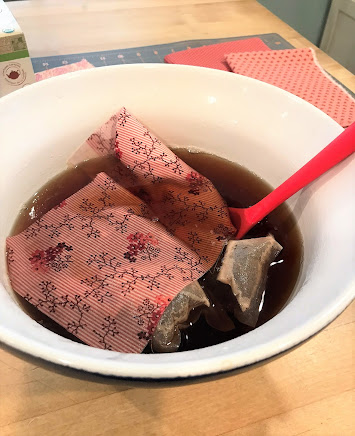
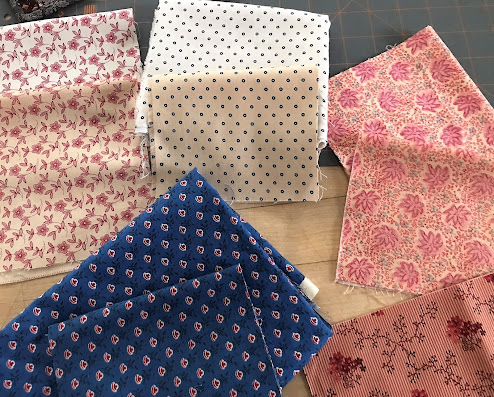
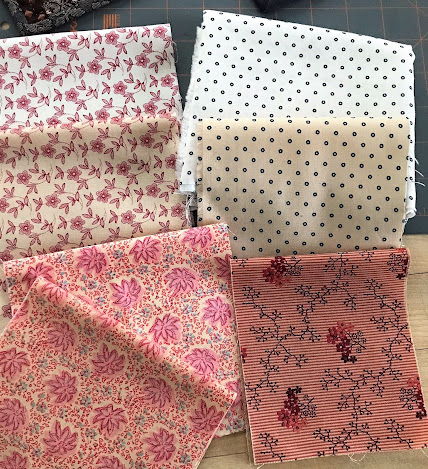
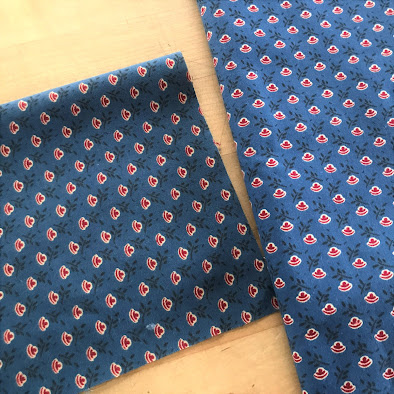
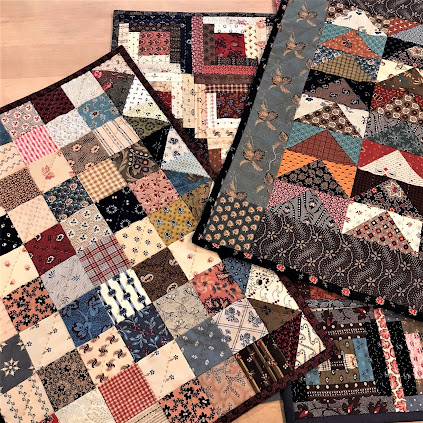
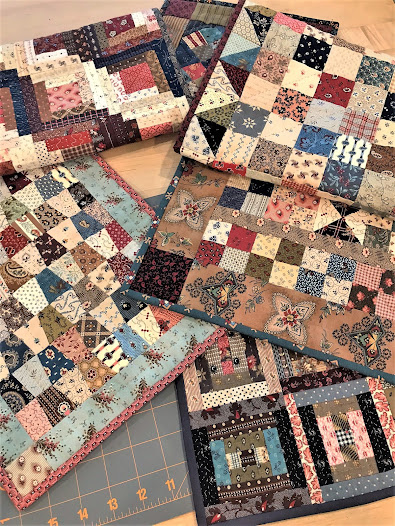








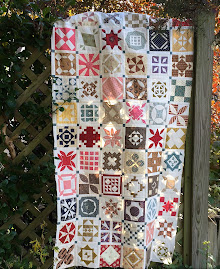

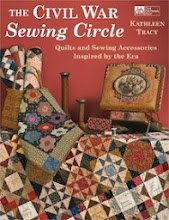
15 comments:
So the tea doesn't wash out when you wash the quilt? I've always wondered about that, because when I spill tea on my clothes, it washes out.
Do you prewash the fabric before tea dying?
Chris - I have to admit, I use it mostly for my smaller projects that are wall hangings and do not get washed very often. I do not notice a lessening over time. I've read that if you wash a quilt that has been tea dyed, after awhile it will wash out unless you "set" it with vinegar or something. You might have to Google that.
Anonymous - I do not prewash every single one of my fabrics. So some are, and some are not. I read that the ones that are prewashed may take the dye better. But, honestly, I am not an expert and I haven't noticed that much of a difference except for the darker fabrics not taking the dye as easily. That light dotted fabric REALLY took the dye fast and I did not pre wash it. So that's why I tell you to use smaller pieces or strips and test after 10 minutes to see how it is taking.
I've noticed too that it is getting harder and harder to get Civil War reproduction fabrics. There seems to be a trend towards bright colours I find disappointing. Also most of the quilt shops around me are closed or closing due to the pandemic and shopping online is difficult to correctly judge the tone of the fabric. Robyn Sydney Australia
I always add a dash of plain old white vinegar when I tea dye (homebrand will do, nothing fancy). I haven't had the colour wash out yet.
Thank you for this, especially showing before and after comparisons. As for colorfast, well, I know when I dribble tea down the front of my favorite shirt, it's permanent!
Muchas gracias por las explicaciones, me has dado ideas para unir telas de chatarra y que tengan una tonalidad uniforme
Besos
I love civil war fabric too,.I used to make a lot of cloth dolls and to make their patchwork aprons look old I tea dyed them,then set the used tea bag on the apron to make darker spots that looked like old stains.it made them look like old quilts!
I have a hard time finding any type of vintage or civil war fabrics here in Canada so am grateful for this clever way of changing the colours of bright fabrics.
Thank you for the information and recipe Kathy
LizL
Thanks for the reminder about
Tea dying. I absolutely love the civil war types and need to remember that I have the power to change a fabric I find too bright!
Thank you. I have not done any tea or coffee dying on fabric for a quilt, but I did coffee dye a few small light leftover 10" squares today. I'm using them for some embroidery pieces to make into Strawberries! Great idea, thanks again.
I'm concerned about the tannins in the tea which can shorten the life of the fabrics. Have you tried any of the pre-made dyed, like Rit?
Oh, funny you should have this now. Just last month I engaged in my first tea-dying venture.
I just finished my Dear Jane (12 years in the making) and decided to put a nice deep blue border around it, rather than the triangles. But after 12 years, I was having trouble finding a suitable Civil War fabric. (Out of style?) I finally found some but when it arrived, the white sprigs of flowers were just too bright.
What would Jane do? That's when the idea of tea-dying came up. Found lots of instructions on line, and it worked like a charm. I'm very pleased. Let the quilting begin.
Susan D - I tea dyed the cream border for my Schoolgirl Sampler quilt. It gave it just the right antique look.
Post a Comment